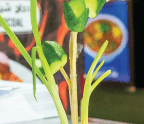Different Forms of Illumination: An Interview with Hermione Hoby
I ran into Hermione Hoby recently at a studio party in an old Greenwich Village brownstone. It was the last party before the occupants had to move out, the building already sold to its new owner. The windows were open to the January air, prosecco sloshed in plastic cups, everyone kept getting too hot so they’d go out to stand in the hallway. People seemed a little sad, a little manic, after a strange winter. There had been a vintage-clothing sale earlier that day, the unsold stock still in the studio. Hoby disappeared to try on a green silk dress in the bathroom. She emerged in the dress, looking uncertain—there was no full-length mirror, she said, so she didn’t know how it looked. We told her the dress looked great. I don’t know if Hoby did, in fact, get the green dress, but the party—someone trying on someone else’s silk dress, a strange elegiac ripple in the air—felt like a scene from Hoby’s own novel, a kind of New York night that seems to happen less and less often the longer you stay here. There are so many moments like that in Neon in Daylight, so many acutely observed interactions that kept reminding me of the dizzying stretch of time after I first moved to the city—how the streets, familiar to me only from movies, seemed to call forth a strange self-consciousness, how every interaction was colored with an intensity that was almost physically exhausting. Hoby is acutely aware of the way lives and desires overlap in this city, how selves are tried on and discarded, and she tracks the minutest shifts of feeling and mood with intelligence and hypersensitivity. Her novel follows Kate, a grad student newly arrived from England, and her relationships with Bill, a washed-up writer still coasting on the success of his first book, and his daughter, Inez, a brash nineteen-year-old who hustles odd jobs off the miscellaneous-romance section of Craigslist. It takes place over the summer and fall of 2012, though the passing of time, as filtered through the consciousness of Kate, takes on the quality of a fever. Life in the city is a kind of welcome sickness.
This interview took place over email.
INTERVIEWER
I was thinking, while reading your book, of the ways living in a city feels like a performance—the city as backdrop, sometimes a cruel and indifferent backdrop. As when Kate, newly arrived in New York, craves cigarettes as someone else. In what ways does the city make their particular relationships possible? Cities are good for that reinvention, the sense of selfhood as performance.
You’re reading a preview, subscribe to read more.
Start your free 30 days


